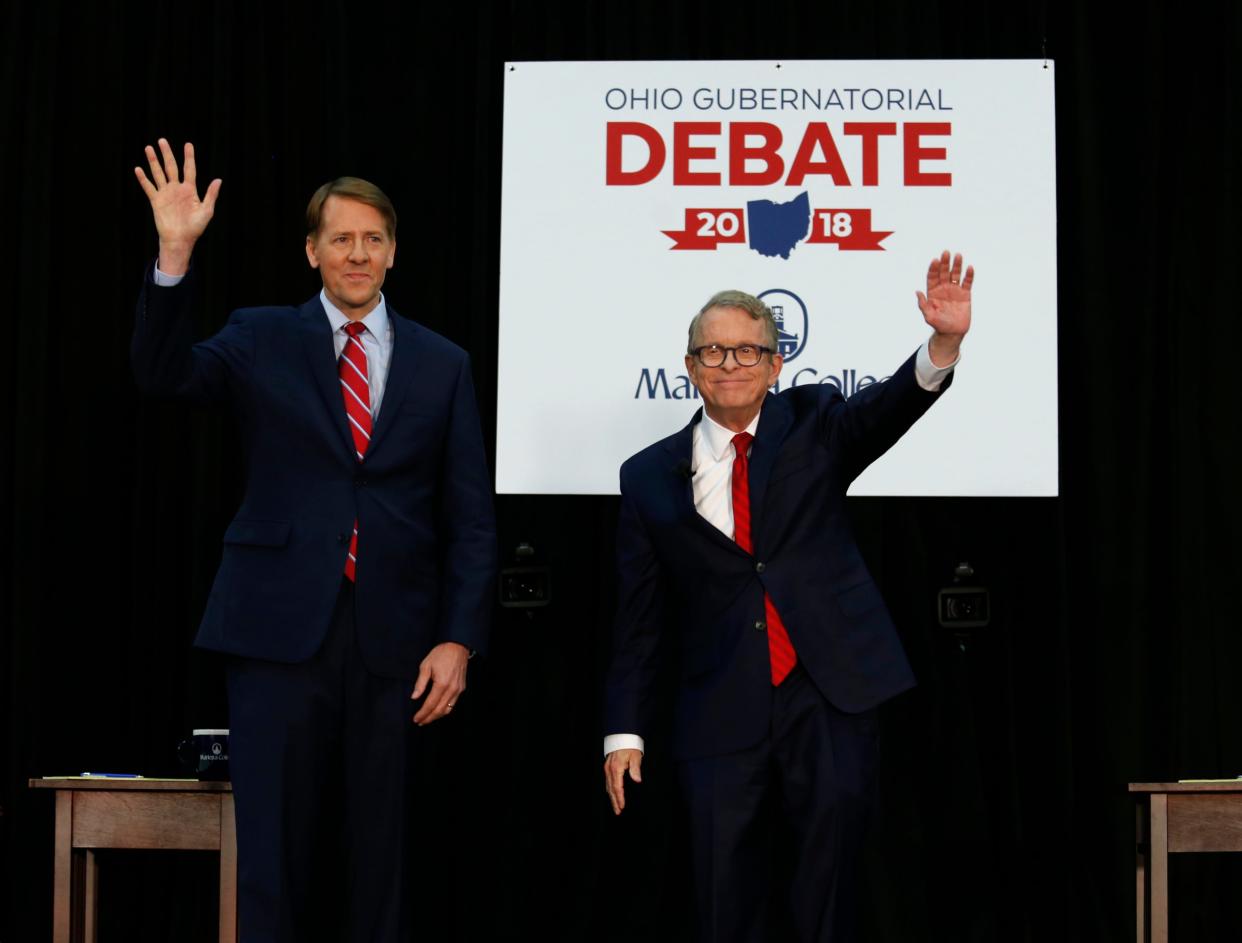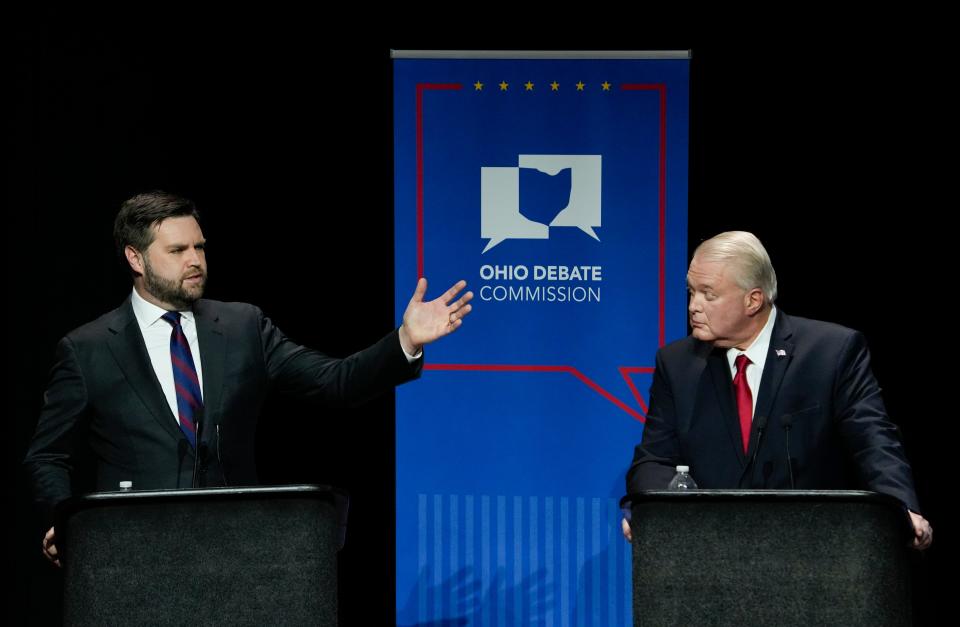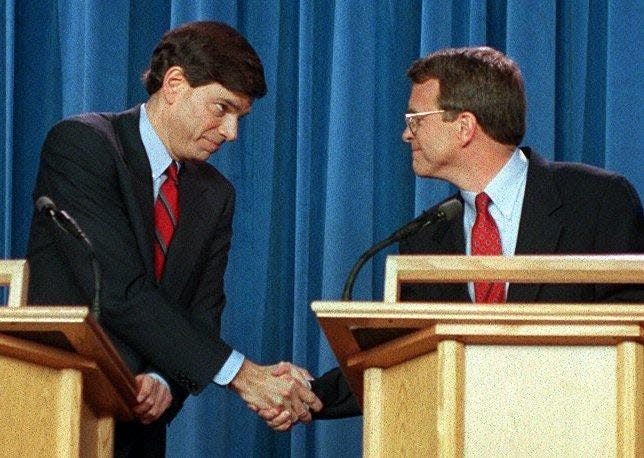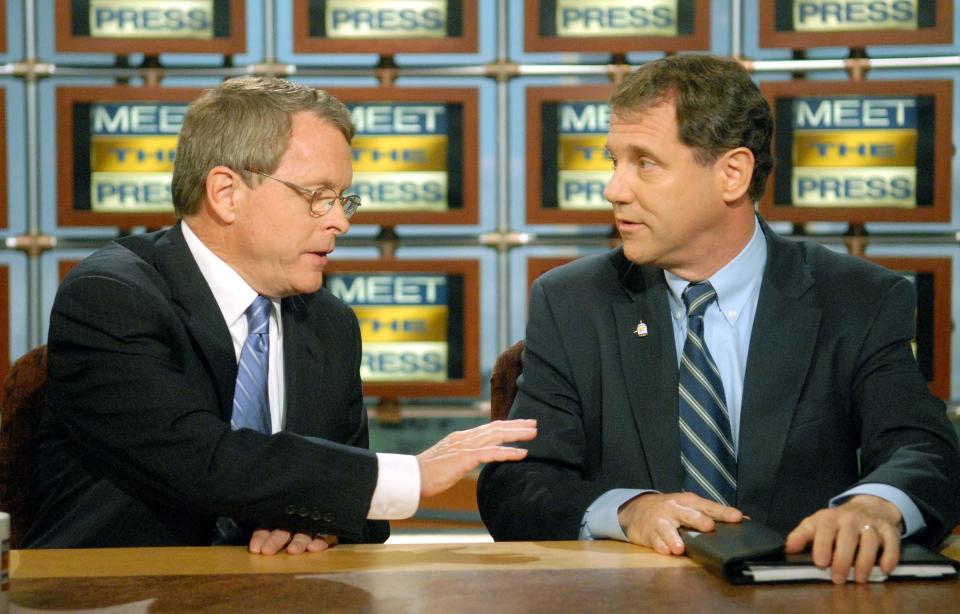Poll: 84% of Ohioans want governor, U.S. Senate candidates to debate

- Oops!Something went wrong.Please try again later.
- Oops!Something went wrong.Please try again later.
- Oops!Something went wrong.Please try again later.
Ohioans overwhelmingly want candidates for the state's top political posts to face off in one-on-one debates, according to a new USA TODAY Network/Suffolk University poll.
About 84% of likely Ohio voters said candidates for Ohio governor and U.S. Senate should debate each other. Only 10% said they should not debate, according to the new poll, which has a margin of error of plus or minus 4.4 percentage points.
Strong support for debates spanned across age, gender and political party, according to the new poll.
U.S. Senate hopefuls J.D. Vance and Tim Ryan are expected to debate, but they haven't yet agreed to the same time and place.
In contrast, Ohio Gov. Mike DeWine has all but said he won't debate Democratic challenger Nan Whaley, a former Dayton mayor.
DeWine leads Whaley in polling, fundraising and name recognition. The USA TODAY Network/Suffolk poll has DeWine leading Whaley, 53.8% to 39.2%. DeWine, a longtime Republican politician, argues that Ohioans already know where he stands on key issues from the economy to guns and abortion.
Column:What does Vance's 'I don't really care' comments say about his foreign policy
Tim Ryan:Democrat calls for 'generational change' when asked if Biden should run again

"Throughout the fall, Governor DeWine and his opponent will have ample opportunity to outline their very different records and visions for Ohio," DeWine spokeswoman Tricia McLaughlin said. She was referring to forums, where candidates don't appear on the same stage at the same time. "Transparency and accessibility to leadership matters, which is why Mike DeWine has held more statewide television addresses and press conferences than any governor in Ohio history."
Whaley contends that debates are a key way voters use to compare and contrast the candidates.
"We disagree on a lot, but I thought at least he believed in democracy and when you don't debate, that is really anti-democratic," Whaley said during a news conference announcing her plan to spend $65 million in state and federal money to create 17,000 union construction jobs.

Is debate ducking a political liability?
But even if Ohioans want debates, will they punish a candidate for not doing one? Probably not.
"Debating is seen as a norm in politics, something that’s supposed to happen," said Kyle Kondik, managing editor of Sabato’s Crystal Ball, the University of Virginia Center for Politics. "I don’t necessarily know if candidates pay a price for ducking debates."
Former Gov. John Kasich, a Republican, broke recent precedent when he refused to debate his Democratic challenger − the beleaguered Cuyahoga County executive Ed FitzGerald − in 2014. Kasich's refusal didn't hurt his reelection bid; He went on to win 86 of 88 counties.
Prior to that, Republican Gov. Jim Rhodes refused to debate Democratic Lt. Gov. Richard Celeste during the 1978 campaign. Rhodes narrowly won his fourth reelection bid.
DeWine has a long history of facing off with his Democratic opponents from then-Sen. John Glenn to ex-state Attorney General Rich Cordray. DeWine took part in debates in all of his races for the U.S. Senate. However, DeWine did refuse to debate Democratic attorney general candidate David Pepper in 2014 and skipped debates with fellow Republicans earlier this year.

"In the ideal world, there would be debates with both candidates appearing on the same stage, answering the same questions, so Ohioans could compare and contrast their ideas," said Herb Asher, a professor emeritus of political science at Ohio State University. "But we don’t live in the ideal world."
For DeWine, there could be more risk than reward, Asher said. Whaley would try to hammer DeWine over his signature on Ohio's six-week abortion ban, the scandal-ridden nuclear bailout in House Bill 6 and the lack of action on gun reform since the Dayton mass shooting in 2019.
"The risks might be there if he had a bad evening," Asher said. "Sometimes the refusal to debate can be used against you, but that doesn’t happen that often."
Jessie Balmert is a reporter for the USA TODAY Network Ohio Bureau, which serves the Akron Beacon Journal, Cincinnati Enquirer, Columbus Dispatch and 18 other affiliated news organizations across Ohio.
This article originally appeared on Cincinnati Enquirer: Ohioans want candidates to debate. But will it hurt them if they duck?

